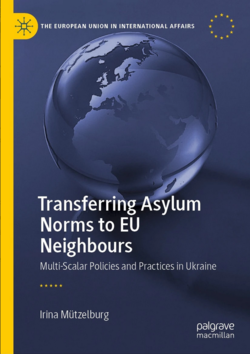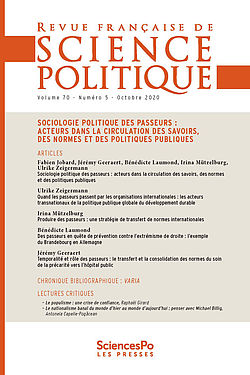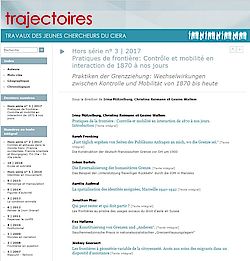Dr. Irina Mützelburg | Associated Researcher
Former Member
Home Institution
:
Zentrum für Osteuropa und Internationale Studien (ZOiS)
|
Disciplines
:
Political Science
|
Biography
Irina Mützelburg is a political scientist and researcher at ZOiS. She is a post-doctoral researcher in the German-French (ANR-DFG) project LimSpaces, which she co-coordinates. In this framework, she researches educational practices and strategies of young people from Ukraine. She is also an associate researcher at the Centre Marc Bloch (Berlin), the Centre de recherches internationales (Paris) and the Institut Convergences Migrations (Paris). Before coming to ZOiS, she worked as a lecturer and research assistant in political sociology at Sciences Po Lyon (2019-2021) and at the Master of European Studies at the European University Viadrina in Frankfurt/Oder (2018-2019). Until 2019, she did her PhD at Sciences Po Paris on international norm and policy transfer in the field of asylum in Ukraine. In 2022 she published her book Transferring Asylum Norms to EU Neighbours with Palgrave Macmillan.
Researchtopic
Published monography: Transferring Asylum Norms to EU Neighbours. Multi-Scalar Policies and Practices in Ukraine
This book analyses why the Ukrainian state established asylum laws and policies in the thirty years since 1991, even though the number of asylum seekers was very low. International and non-governmental organisations transferred international asylum norms to Ukraine. Various state and non-state actors participated in this process, translating, spreading, and resisting those norms. In many cases, legislative adoption was driven by domestic politicians’ pursuit of recognition by international organisations, such as the European Union and the Council of Europe, and by their desire to meet conditionality requirements. NGOs sought to influence administrative practices, alternating between confrontational and conciliatory, formal and informal approaches, and often relying on personal contacts. Actors used and shifted between scales in order to transfer norms or resist transfer. In the process, they produced, renegotiated, and confirmed those scales. For instance, NGOs resorting to the European Court of Human Rights to prevent refoulement placed the European scale above the national scale. This book offers a new multi-actor and multi-scalar analysis of policy transfer.
Title of thesis
Multi-Level Transfer of International Norms: Asylum Policies and Practices in Ukraine (1993-2015)Summary of thesis
This thesis uncovers the importance of often overlooked actors and transfer channels by adopting a longitudinal and multi-level perspective on international norm and policy transfer. It examines the role of international organisations in the development of asylum policies and practices in Ukraine since the adoption of the first Law on Refugees. It shows how the action of international and domestic non-governmental organisations is interlinked with and differs from the sector-specific conditionality exercised by the European Union. In this manner, it enriches the findings on transfer from research that has mostly focused on top-down processes and political elite actors. It investigates the interactions and relations between state and non-state actors of the “transfer chain”, revealing logics of dependence, delegation and control as well as processes of translation, support and resistance. Analysing the support and subtle forms of resistance to the legislative adoption of international norms at the Parliament, it demonstrates that adoption is shaped, to a large extent, by domestic politicians’ pursuit of recognition and incentives by international organisations. Moreover, non-state actors seek to influence state practices by adapting their strategies to domestic resistance and structural obstacles, utilising confrontational and harmony-seeking, formal and informal, top-down and horizontal strategies. While norm entrepreneurs try to trigger the formalisation of certain changes, the effects of the transfer attempts on state practices remain heterogeneous and unstable. This thesis thus adds to transfer scholars’ widespread findings regarding the weak application of norms.
Institution of thesis
Supervisor
Projects
- Foreign language teaching and learning
- Migration and asylum policies
- Transfer of norms and policies
- Mutual dependencies of state, non-state, international and national actors
- Implementation of public policy, adaptation to instability, recourse to informality and improvisation in post-communist states
- School education for pupils who have fled from Ukraine in the host countries, especially in Germany
School education for pupils who have fled from Ukraine in the host countries, especially in Germany
The European Union in International Affairs (EUIA)
Edition: Palgrave Macmillan
Collection: The European Union in International Affairs (EUIA)
ISBN: 978-3-031-04527-1
This book analyses why the Ukrainian state established asylum laws and policies in the thirty years since 1991, even though the number of asylum seekers was very low. International and non-governmental organisations transferred international asylum norms to Ukraine. Various state and non-state actors participated in this process, translating, spreading, and resisting those norms. In many cases, legislative adoption was driven by domestic politicians’ pursuit of recognition by international organisations, such as the European Union and the Council of Europe, and by their desire to meet conditionality requirements. NGOs sought to influence administrative practices, alternating between confrontational and conciliatory, formal and informal approaches, and often relying on personal contacts. Actors used and shifted between scales in order to transfer norms or resist transfer. In the process, they produced, renegotiated, and confirmed those scales. For instance, NGOs resorting to the European Court of Human Rights to prevent refoulement placed the European scale above the national scale. This book offers a new multi-actor and multi-scalar analysis of policy transfer.
https://link.springer.com/book/10.1007/978-3-031-04528-8#about-this-book
Revue française de science politique 70-5, octobre 2020
November 30, 2020Jérémy Geeraert , Fabien Jobard , Bénédicte Laumond , Irina Mützelburg , Ulrike Zeigermann
Collection: Revue française de science politique
ISBN: 00352950
Sociologie politique des passeurs-Quand les passeurs passent par les organisations internationales-Produire des passeurs-Des passeurs en quête de prévention contre l'extrémisme de droite-Le transfert et la consolidation des normes du soin de la précarité vers l’hôpital public.
Le dossier thématique de ce numéro est consacré à une nouvelle catégorie d'analyse, celle des passeurs de normes, d’idées et d’instruments d’action publique, qui permet d’interroger à nouveaux frais le domaine des policy transfer studies. Au croisement de la sociologie de l’international et de la sociologie de l’analyse des politiques publiques, cette approche accorde une place centrale à la sociologie des acteurs en contexte, tant national qu’international ou transnational, ainsi qu’à la temporalité des dynamiques de passage. Une chronique bibliographique varia complète ce volume.
Hors-série de la revue Trajectoires: "Pratiques de frontière"
July 21, 2017Irina Mützelburg , Christina Reimann , Gesine Wallem
Le Hors-série n°3 (2017) de la revue en ligne Trajectoires (CIERA) vient de paraître sous le titre:
Pratiques de frontière: Contrôle et mobilité en interaction de 1870 à nos jours
Praktiken der Grenzziehung: Wechselwirkungen zwischen Kontrolle und Mobilität von 1870 bis heute
Ce numéro a été coordonné par Irina Mützelburg, Dr. Christina Reimann et Gesine Wallem. Les contributions sont le fruit du Junges Forum organisé en octobre 2015 sur le thème « Migrations et frontières : La construction de frontières par des pratiques administratives et sociales (des années 1880 à nos jours) ».
Accès au dossier : https://trajectoires.revues.org/2338
Contenu du numéro:
- Irina Mützelburg, Christina Reimann et Gesine WallemPratiques de la frontière : Contrôle et mobilité en interaction de 1870 à nos jours. Introduction [Texte intégral]
- Sarah Frenking„Fast täglich ergehen von Seiten des Publikums Anfragen an mich, wo die Grenze sei.“ [Texte intégral]Die Konstruktion der deutsch-französischen Grenze vor Ort um 1900
- Inken BartelsDie Externalisierung der humanitären Grenze. [Texte intégral]Das Beispiel der ‚Unterstützung freiwilliger Rückkehr‘ durch die IOM in Marokko
- Aurélie AudevalLa spatialisation des identités assignées, Marseille 1940-1942 [Texte intégral]
- Jonathan MiazQui peut rester et qui doit partir ? [Texte intégral]Les frontières au prisme des usages sociaux du droit d’asile en Suisse
- Eva HallamaSeuchenmedizinische Praxis in nationalsozialistischen „Grenzentlausungslagern“
- Jérémy GeeraertLes frontières à géométrie variable de la citoyenneté. Accès aux soins des migrants dans un dispositif d’assistance [Texte intégral]
Publications
(2023), NGOs in Ukraine’s Multi-Scalar Asylum Governance – Between Influence and Dependence on State Authorities. Journal of Intercultural Studies 44, 125–142. https://doi.org/10.1080/07256868.2022.2146664
(2023), Resisting International Norm Transfer While Seeking International Recognition – Ukrainian Asylum Lawmaking. European Journal of Migration and Law 25, 358–375. https://doi.org/10.1163/15718166-12340156
(2023), with Félix Krawatzek, Education and Displacement: Ukrainian Families in Germany (No. 1/2023), ZOiS Report. Berlin.
(2023), with Brendan Lawson and Joel Glasman, Humanitarian Numbers in the Russian–Ukrainian War: An Interview with Irina Mützelburg (October 2022). Journal of Humanitarian Affairs, 5(1), 52–61. https://doi.org/10.7227/JHA.102
(2022), Flucht in und aus der Ukraine. Ukraine-Analysen 2–6. https://doi.org/10.31205/UA.269.01
(2022), Geflüchtete Schüler*innen aus der Ukraine. Berliner Bildungszeitschrift - bbz Zeitschrift der GEW.
(2022), Transferring Asylum Norms to EU Neighbours. Multi-Scalar Policies and Practices in Ukraine, Houndsmills, Palgrave Macmillan (The European Union in International Affairs).
(2022) with Sabine von Löwis, « Alltagsentscheidungen im Krieg in der Ukraine », ZOiS Spotlight n° 9/2022. https://www.zois-berlin.de/publikationen/zois-spotlight/alltagsentscheidungen-im-krieg-in-der-ukraine
(2020), « Remote Management of the European Neighbourhood Policy: the Neoliberal Bureaucratisation of the Non-Governmental Sector in Ukraine », Revue d’études comparatives Est-Ouest, n° 4: 45–75. https://www.cairn.info/revue-revue-d-etudes-comparatives-est-ouest-2020-4-page-45.htm
(2020) with Jobard, Fabien ; Geeraert, Jérémy ; Laumond, Bénédicte ; Zeigermann, Ulrike, « Sociologie politique des passeurs. Acteurs dans la circulation de savoirs, de normes et de politiques publiques », Revue française de science politique, Vol. 70, n° 5, p. 557‑573. https://www.cairn.info/revue-francaise-de-science-politique-2020-5-page-557.htm
(2020), « Produire des passeurs : une stratégie de transfert de normes internationales », Revue française de science politique, vol. Vol. 70, n° 5, p. 595‑615. https://www.cairn.info/revue-francaise-de-science-politique-2020-5-page-595.htm
(2019), « The Role of EU and International Organizations’ Strategies and Interdependencies in the Transfer of International Norms: The Case of Ukrainian Asylum Law », in Delcour L., Tulmets E. (dirs.), Policy Transfer and Norm Circulation: Towards an Interdisciplinary and Comparative Approach, Abingdon-on-Thames, Routledge, p. 162‑181.
(2019), « Régime migratoire / Migrationsregime », Mobilität, Migration und räumliche Neuordnung | Mobilités, Migrations, Recomposition des espaces. https://rm2.hypotheses.org/997.
(2018), « L’empowerment par des financements internationaux ? Comment les donateurs créent un secteur non étatique en Ukraine », Revue Gouvernance, vol. 15, n° 1, p. 63‑85. https://www.erudit.org/fr/revues/gouvernance/2018-v15-n1-gouvernance04299/1056261ar/
(2017), « Monitoring an asylum system in the EU neighbourhood: the reliance of the European Union on the knowledge production of UNHCR », in Tekin B., Danış D. (dirs.), Visions croisées autour des frontières européennes : mobilité, sécurité et frontières, Istanbul, Editions de l’Université Galatasaray, p. 45‑59.
(2017) with Reimann, Christina ; Wallem, Gesine, « Pratiques de la frontière : Contrôle et mobilité en interaction de 1870 à nos jours. Introduction » Mützelburg I., Reimann C., Wallem G. (dirs.), Trajectoires. Travaux des jeunes chercheurs du CIERA, n° Hors série n° 3. https://trajectoires.revues.org/2339
(2011), « Das nationale Tschernobyl-Museum: Die scheinbare Abwesenheit von Politisierung – politisch oder unpolitisch? », UkraineNachrichten. https://ukraine-nachrichten.de/nationale-tschernobyl-museum-scheinbare-abwesenheit-politisierung-politisch-oder-unpolitisch_3441


